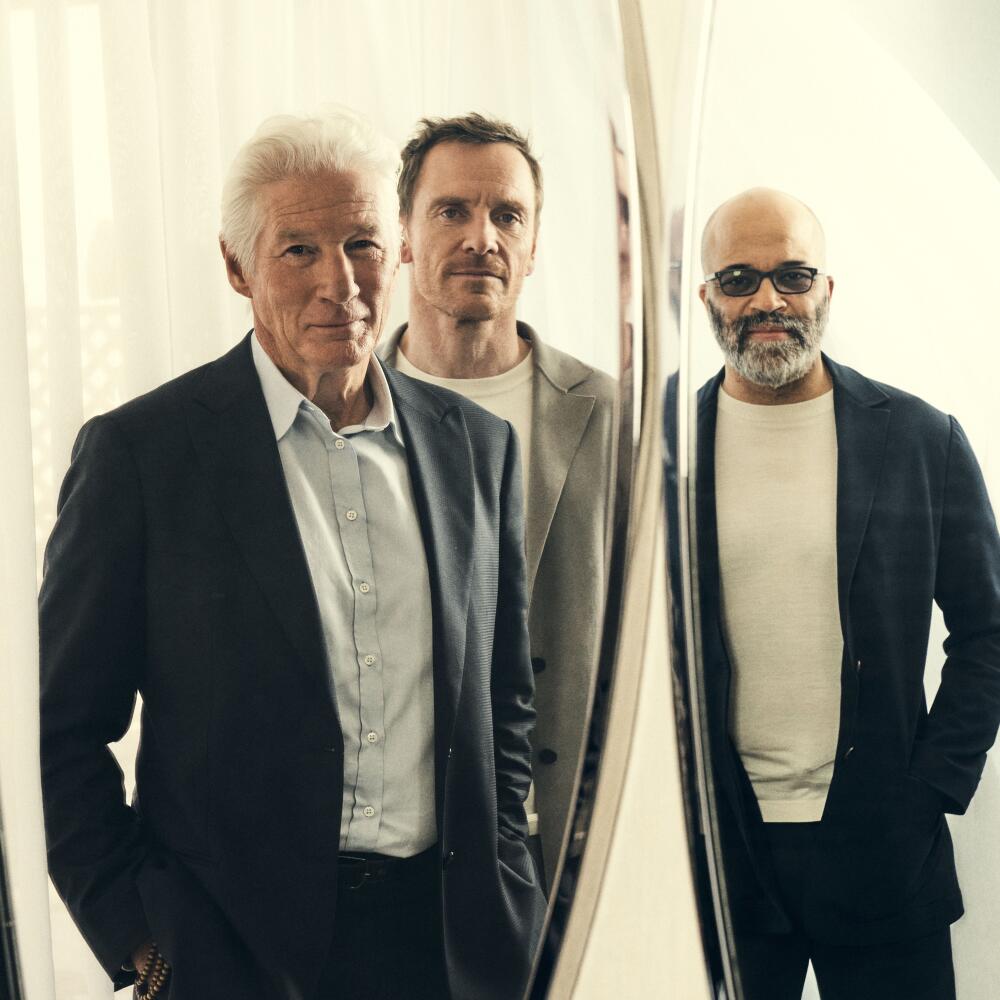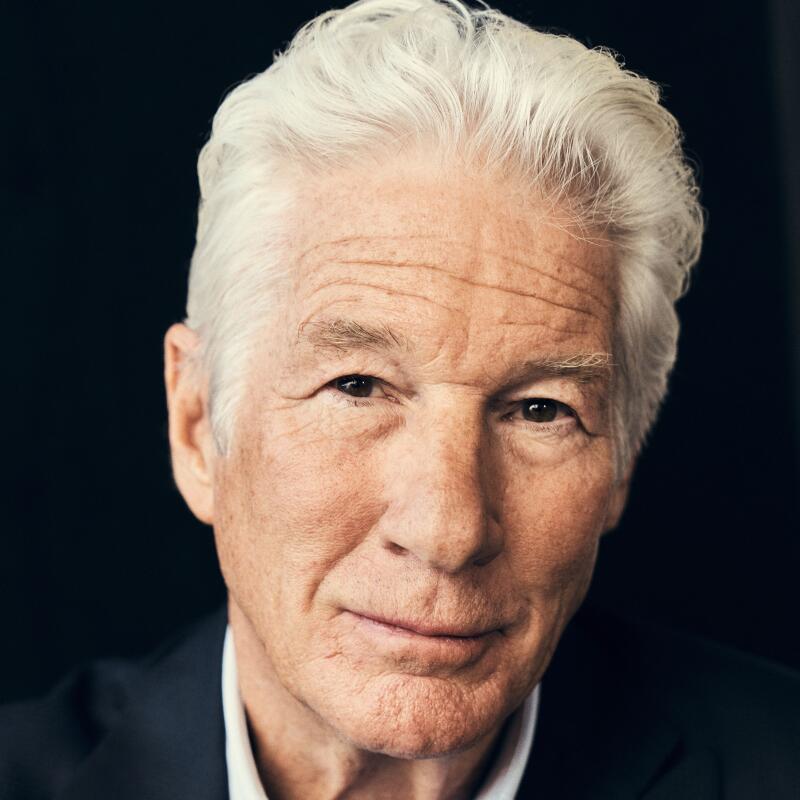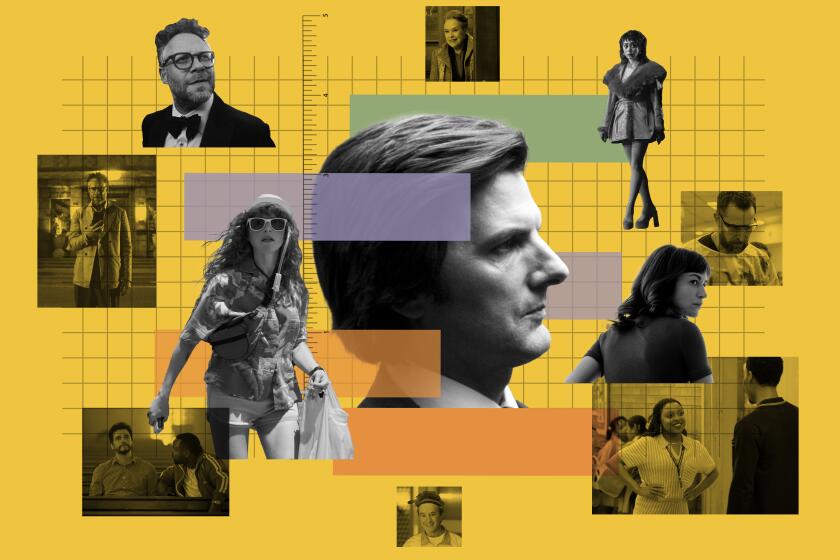
- Share via
The spy is the most devoted of employees. His or her line of work demands utter commitment, if not active contempt for the very concept of a “personal life.” Cunningly, Jez and John-Henry Butterworth’s “The Agency” — a remake of the French series “Le Bureau des Légendes”— pushes its central character to question that arrangement.
Michael Fassbender stars as Martian, a CIA spy who’s recalled to London after years of living deep undercover in Ethiopia. Once a free agent, he’s now constrained by the rigid bureaucratic machinations of desk work and office politics, often pitting him against his boss, Henry Ogletree (Jeffrey Wright), and London Station bureau chief James “Bosko” Bradley (Richard Gere).
As escalating geopolitical tensions bubble up around them all — in Belarus, Sudan and beyond — Martian wonders what he might be willing to risk when his former lover, Samia Fatima Zahir (Jodie Turner-Smith), reappears in his life. Stoic and self-aware, Fassbender’s Martian is a slippery figure whose sense of self begins to unravel as the show’s thrilling first season unfurls.
Our panel of Emmy experts picks who’s in, who’s out and who’s on the bubble as the 2025 campaign gets underway.
“He’s really addicted to the juice of the job,” Fassbender tells The Times, sitting between Gere and Wright. “That’s where he gets his kicks from. He has this loving relationship that is the only real thing for him that will connect him to his humanity. But he’s great at his job and he’s kind of addicted to it. That’s where I wondered, ‘Does Bosko miss being out in the field?’”
“Oh, yeah,” Gere says, nodding. “He does. He was good at it. It was the trench-warfare mentality of it. The danger. The addiction to the energy and the adrenaline of it. He’s an alcoholic for it. They all are. There’s no one who walks away from this safely.”
The job of the actor is to reveal, that of the spy to withhold. It’s why Gere pushed for Bosko to be even more of a cipher than he was on the page.



1. Michael Fassbender. 2. Richard Gere. 3. Jeffrey Wright. (Shayan Asgharnia / For The Times)
“I felt like I instinctively knew this guy,” Gere says, recalling his initial conversations with Joe Wright (“Atonement,” “Darkest Hour”), who directed the first two episodes of the Paramount+ With Showtime series. “We weren’t totally on the same wavelength of who this character was. I think I was positing a more unknowable, nuanced character than he was. I even removed mentions of my own home life, of my backstory.
“It’s in here,” he says, gesturing at his temples. “I know it. And that’s enough.”
As the agency struggles to contain an increasingly volatile situation involving a missing asset on the front lines of Russia’s war in Ukraine, the former field agents in London find that their preferred tactics can create friction in an office environment, where politicking requires a defter touch.
“For Martian, it’s about being the sharp end of the stick and being out there,” Fassbender says. “And being your own boss. Martian has an ego. He has his own set of rules. He does everything his own way.”
Billy Bob Thornton reflects on life in the tabloid spotlight with Angelina Jolie, Jason Isaacs discusses the ‘shocking’ scrutiny of ‘The White Lotus’ cast and more tales from the Envelope Drama Roundtable.
Henry, in tweed suits and suitably nebbishy glasses, feels more like a company man than his two colleagues. Jeffrey Wright, an Emmy winner for “Angels in America” in 2004, channeled the Washington, D.C., world he grew up in to create a portrait of a dutiful government employee.
“I have a great deal of respect for federal employees, particularly more so now in a time when they’re under such grievous and biased attack,” Wright says. “I think we conflate, at times, our criticism of the government with criticism that should be leveled at the politicians. But I have a great deal more respect for the people who go to work every day to be a part of the government than I do for many of the politicians who are playing theatrics in the public eye.”
The London office where much of “The Agency” takes place captures the contradictions of this contemporary espionage drama. With wall-to-wall windows that look out over the city — re-created on soundstages with the use of giant LED screens — and a glassed-in conference room at the heart of the floor, the environment itself suggests the possibility of omnipresent surveillance.

The space reminds viewers and characters alike how precious and precarious privacy is in this world. Such immersion helped the trio of actors lose themselves in “The Agency’s” high-stakes workplace drama, where government secrets and transactional dynamics rule day-to-day operations.
“There’s an argument to be made that the only time that you could unconsciously have an artistic experience with a piece is through architecture,” says Wright, “walking through spaces where we’re taking in this design but where we’re not necessarily conscious of it. I was thinking about it in terms of what we do as actors, that we actually have an opportunity to experience art in a very intimate way, in a way that no other profession does. We get to live inside this literary experience and place ourselves inside of it.”
It’s not hard to see parallels between what agents like Martian go through when going deep undercover and what actors are called to do. Just don’t ask Fassbender to be up for the job.
“It is terrifying, pretending to do this,” Fassbender points out. “Constantly I’m thinking, ‘Jesus, the reality of it is just terrifying.’ And I would be so bad at it.”
More to Read
Sign up for The Envelope
Get exclusive awards season news, in-depth interviews and columnist Glenn Whipp’s must-read analysis straight to your inbox.
You may occasionally receive promotional content from the Los Angeles Times.












